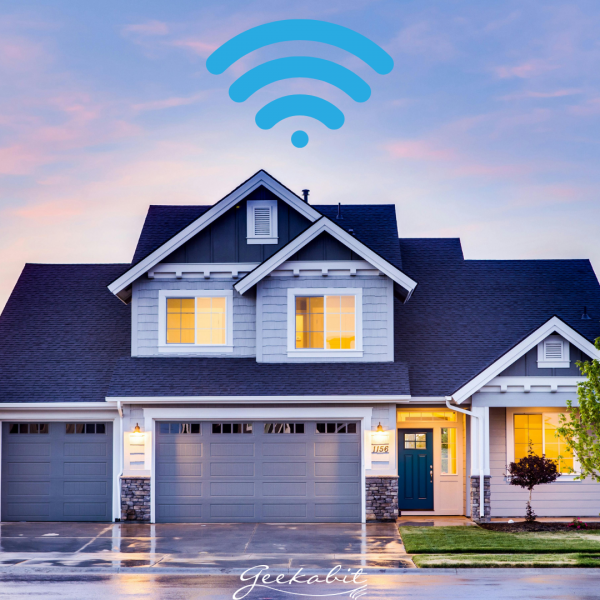
They can indeed. And it can be handy to know the signs if an extender is about to fail.
Disclaimer: Here at Geekabit, we don’t actually recommend Wi-Fi extenders as a solution to Wi-Fi problems. There are usually other more effective solutions that can be put into place with a little help from Wi-Fi experts like ourselves. However, we also know that people don’t always heed expert advice… So, here are some useful tips to keep in mind if you do go down the Wi-Fi extender route. And if that doesn’t work, you’ll know who to call.
Just like other electronic devices, Wi-Fi extenders can fail. Whilst they do tend to last a decent amount of time and generally don’t need too much maintenance or repairing, they still won’t last forever. As with anything in the tech world, components will start to wear out and older extender models will become obsolete with the emergence of new technologies. Let’s take a look at some of the main issues that could stop a Wi-Fi extender from working.
Why has my Wi-Fi Extender stopped working?
There could be a number of reasons why Wi-Fi extenders might stop working earlier than you would expect. The number one reason for a Wi-Fi extender to break down is heat.
Overheating
Like other electronic devices, Wi-Fi extenders generate heat. However, they don’t have fans or anything else to keep the heta from building up, so rely on passive cooling. This can be a big problem when they are switched on all the time, never getting the chance to cool down.
To prevent a Wi-Fi extender from failing too soon due to overheating, there are a couple of things you can keep in mind.
- Place the Wi-Fi extender in a place where there is plenty of air flow around it e.g. an open book shelf
- Avoid places where there is less air flow like shelving units, cupboards, cabinets or enclosed spaces
Dust
How often do you clean your Wi-Fi devices and hardware? A simple, regular clean of your Wi-Fi extender can help extend its life. Whilst we wouldn’t recommend taking a Wi-Fi extender apart to clean inside it, it’s definitely worth the effort to check the vents on it and blow away any dust.
New Technologies
As with any kind of Wi-Fi hardware, things do become obsolete over time as new technologies are developed and introduced to the market.
A popular reason for people to replace their Wi-Fi extenders is to make sure that their extended network is as fast and can handle as many devices as their primary network.
When should I replace my Wi-Fi extender?
If everything is working to your satisfaction, then there’s no need to replace anything. However, if you’ve been googling ‘do I need to replace my Wi-Fi extender?’ then you’re probably already experiencing problems and looking for the solution!
Preemptive replacement of Wi-Fi hardware would usually be for crucial network components, for example, your router. Wi-Fi extenders aren’t usually as important, so there’s usually no need to replace them until they break.
However, if you are relying on your Wi-Fi extender to provide internet access to parts of your home or to devices that must be connected (for example, perhaps a garden office or CCTV cameras) then you may feel it’s more important to stay ahead of problems and replace them before issues arise.
There isn’t really a set time frame for replacing a Wi-Fi extender – They can last for as long as ten years, maybe more. But there will come a time when internal components will start to fail as they naturally start to degrade. In scenarios like the above where your Wi-Fi extender is fulfilling a vital function, you might want to consider replacing it on a shorter timeframe e.g. every 5 years perhaps or when you notice any reduction in performance.
Can I tell if my Wi-Fi extender is starting to fail?
Unfortunately, there’s rarely obvious signs that a Wi-Fi extender is beginning to fail. They tend to work one day, and not work the next. There may be some clues that it’s starting to degrade, which we’ll outline below, but this may not always be the case.
Possible signs that your Wi-Fi extender is starting to fail:
- Having to regularly reset the Wi-Fi extender. Whilst doing a factory reset may fix the issue, if you’re having to do this a lot then it’s probably time to consider replacing it.
- Difficulty connecting to the Wi-Fi extender. If interference isn’t an issue, but your devices are having trouble connecting or staying connected then it might be time to replace the extender.
- Slow internet speeds. If your connection is suddenly slower one day, then there is likely a problem with the extender. Also bear in mind that if your extender is older than your router, then it likely won’t support the latest Wi-Fi technology available to your router, hence causing a slower connection in the extended area.
- Dropped connection. If you can connect a device to your primary network, but it drops out when connecting to the extender then there is likely a problem with the Wi-Fi extender.
- Error lights. If lights on the extender are the wrong colour, flashing or not on at all then there is likely an issue. Check the manufacturer’s instructions to find out what the lights mean and how to resolve the problem.
- Unable to turn the Wi-Fi extender on. It may have overheated, so let it cool down and then try again to turn it on. You could also try plugging it into an alternative outlet. Pressing the rest button may also help with this issue. If after trying these things it still won’t turn on then it’s probably time to replace it.
How can I help my Wi-Fi extender last longer?
No hardware can last for ever, so eventually all Wi-Fi extenders are going to fill and need replacing. That being said, there are some things you can do to take good care of it and help it to last as long as possible. As we noted above, the most common problems are caused by heat, so the main solutions lie in keeping the gear cool.
Help your Wi-Fi extender have a long life using these tips:
- When you’re setting up, always place your Wi-Fi extender in a well-ventilated area. Never place it in an enclosed space like a closed shelf or cabinet. Not only will an enclosed space block the Wi-Fi signal, but it will also cause the extender to get hotter than necessary, which will shorten its life.
- Use a surge protector in the same location as the Wi-Fi extender if possible. This can help stop voltage spikes which can cause severe damage to a Wi-Fi extender.
- Regularly give the extender a clean and remove dust by dusting the outside of it and blow dust from the vents. Dust build-up can also contribute to overheating.
- Sometimes firmware updates from manufacturers can help keep performance at its best. If you notice worsening performance then it’s worth trying to install a firmware update (if there is one) to help speed up an older Wi-Fi extender model.
Is my Wi-Fi extender causing network issues?
Problems with Wi-Fi connectivity and speed are the first clues when it comes to identifying if a Wi-Fi extender is failing or starting to fail.
Got a unique SSID for your extender? Then you’ll notice right away that you’re having problems connecting to it compared with your primary network.
Using a mesh network? If you’re using the same SSID and password for your extended network as your primary network or using a mesh network then you might notice you have connection trouble or slow internet speeds when you’re in the extended network area.
As you’ll remember from our disclaimer at the start of this article, here at Geekabit we don’t recommend Wi-Fi extenders. One of the reasons why we don’t is that they can cause problems for your network even when they’re working.
One of the biggest problems with Wi-Fi extenders is that they can actually cause interference on your primary network if they’re running on the same channel. So by trying to extend your network to a further area of your house and garden, you could be jeopardising your main network connection.
This issue is reduced when using a mesh network as they create one big network where devices are seamlessly passed from one extender to the next. However, your bog-standard Wi-Fi extenders can cause real issues with your main Wi-Fi router if they’re operating on the same or overlapping channels.
If you’re trying to create a reliable network across a large space and finding a regular router isn’t quite cutting it, then it might be time to call in the experts rather than reaching for the extenders. Give our friendly Wi-Fi engineers a call and we can identify the best Wi-Fi solution for your premises.



